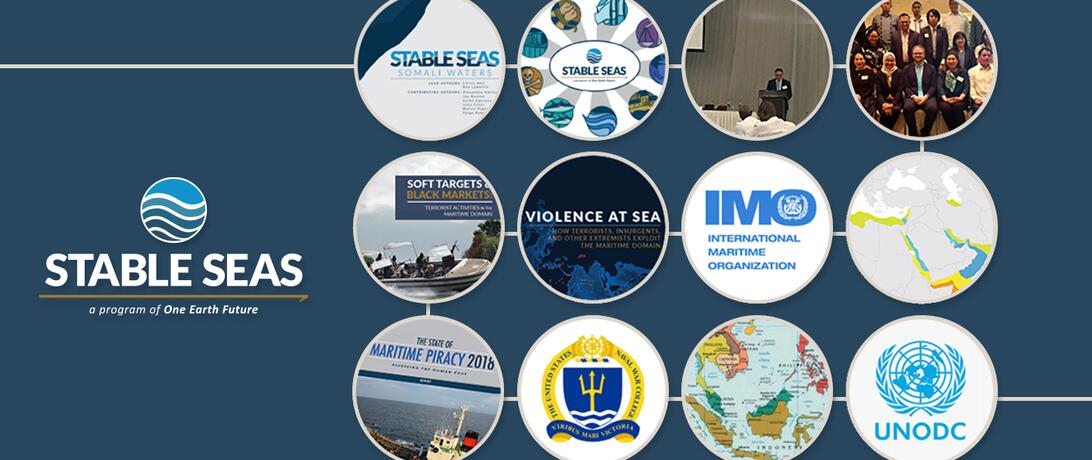
OEF’s Stable Seas program will close at the end of April. In line with our approach to incubation, it will spin off to become an independent foundation, maintaining its focus on maritime security and continuing to work with stakeholders in the maritime sector around the world. Over its five years at One Earth Future, Stable Seas has constantly iterated and grown its impact on issues relating to maritime security, collective approaches to sustainable peace, and evidence-based practice in peacebuilding.
OEF’s Stable Seas program will close at the end of April as a program of One Earth Future. In line with our approach to incubation, it will spin off to become an independent foundation, maintaining its focus on maritime security and continuing to work with stakeholders in the maritime sector around the world. Over its five years at One Earth Future, Stable Seas has been an energetic and impactful program, constantly iterating and growing its impact on issues relating to maritime security, collective approaches to sustainable peace, and evidence-based practice in peacebuilding. For those who haven’t focused on this program before, below are some highlights of its work.
Stable Seas began to take form in 2016 as a collaboration between OEF Research, Secure Fisheries, and Oceans Beyond Piracy, focused on developing a more comprehensive, and holistic understanding of the interconnected nature of maritime security challenges. It's primary initial project was the Maritime Security Index, which was one of the first attempts to measure disparate issues relating to maritime security as all parts of an overall concept, rather than siloed issue areas. The index demonstrated OEF’s thinking about security as a multidimensional system, and was quickly taken up by navies, coast guards, and government agencies around the world as a tool for measuring and thinking about maritime security.
Building on that index, Stable Seas took over the ongoing production of OEF’s State of Piracy reports when Oceans Beyond Piracy closed, and then developed an innovative outreach strategy where they looked for opportunities to work with governments to provide research which helped inform their approach to maritime security. Stable Seas responded to requests from UNODC and national governments in Southeast Asia, South Asia, Africa, and the Caribbean to develop targeted reports and analysis focused on specific issues of concern but promoting Stable Seas’ holistic approach to thinking about maritime security. It also worked with a variety of international and multilateral organizations, navies, maritime law enforcement agencies and civil society actors to provide more fine-grained analysis on emerging maritime security issues. Throughout its work it emphasised how violent non-state actors exploit the maritime domain and the connection between insecurity at sea and onshore.
In its time at OEF, Stable Seas illustrated the value of complex and systemic thinking about security challenges and the way that impartial, evidence-based analysis can help to spur new approaches to sustainable peace. As an independent foundation, we expect that they’ll continue to drive impact in maritime security for a long while to come.
For more information about the Stable Seas Foundation, you can visit their website at stableseas.org
Stable Seas Incubation Timeline
Stable Seas emerged as a collaboration between three existing OEF programs: Oceans Beyond Piracy, Secure Fisheries and OEF Research. The project arose from the desire to apply a more comprehensive and holistic lens to complex maritime security and governance issues which are often approached in isolation. The project was designed to highlight the relationship between these issues, measure them with empirical data collection, and produce research that informs maritime security policy making. From a small cross program project team the Stable Seas grew into a dedicated program of OEF as its work quickly gained attention in the global maritime security community. As Stable Seas developed it became a trusted resource for rigorous and impartial research on maritime security issues and began to attract significant funding from major international and multilateral actors in the maritime security community. After several years Stable Seas founding Director departed OEF for other opportunities in the maritime security field. At this point OEF made the decision to end its financial support to the program. However, Stable Seas now lives on as an independent research organization focused on holistic maritime security, and continues the work and the impact on international peace and governance made possible by OEF’s initial investment.
Article Details
Published
Topic
Program
Content Type
News